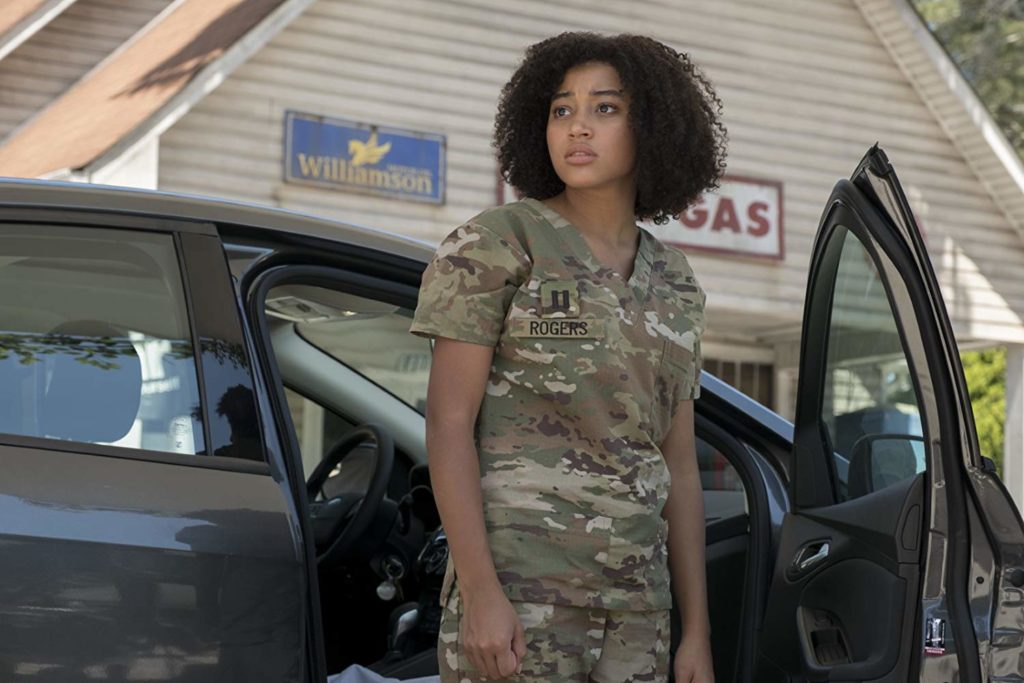Amandla Stenberg broke out in 2012 with her supporting role in “The Hunger Games,” but the actress takes the lead in another dystopian YA adaptation in theaters now. She toplines Jennifer Yuh Nelson’s take on Alexandra Bracken’s “The Darkest Minds,” which opened August 3. “The character was written white,” she tells Variety in a new interview. “It was exciting for me to have a black girl at the helm, because we’ve seen these with Jennifer Lawrence and Shailene Woodley, and they’ve done a fantastic job. But we’ve never gotten diverse representation.”
Diverse representation is important to Stenberg — so important that she chose not to pursue the role of Shuri in “Black Panther” because she believed a darker-skinned actress should play the character. “That was not a space that I should have taken up,” the 19-year-old observes. “And it was so exhilarating to see it fulfilled by people who should have been a part of it and who deserved it and who were right for it. I just wasn’t.”
Stenberg is biracial, and as the source notes, she’s often lumped together with two other rising biracial stars, Yara Shahidi (“Grown-ish”) and Zendaya (“Spider-Man: Homecoming”). “Something interesting has happened with me and Yara and Zendaya — there is a level of accessibility of being biracial that has afforded us attention in a way that I don’t think would have been afforded to us otherwise,” Stenberg acknowledges. “Me and Yara and Zendaya are perceived in the same way, I guess, because we are lighter-skinned black girls and we fill this interesting place of being accessible to Hollywood and accessible to white people in a way that darker-skinned girls are not afforded the same privilege.”
Heartened by the success of “Black Panther” and “Crazy Rich Asians,” Stenberg is hopeful about the future of Hollywood. “As a kid, it was nearly impossible for me to find roles that felt empowered, that were not victim roles, that were fully dimensional, that didn’t serve any white male plotline,” she recalls. “So I worked less because I had no interest in doing something that would force me to compromise my own power or just make myself subservient to something I didn’t necessarily mesh with.” She adds, “I’ve been acting since I was a very little kid, so I have been aware of how the industry works. We’re at a turning point,” she emphasizes, “but we have by no means fixed the misogyny of Hollywood or white patriarchy. But in terms of how we diversify our sets and diversify our on-screen narratives, I definitely think it’s a great time of change.”
And Stanberg is determined to play a role in making that change happen. “She recently lobbied her agents, successfully demanding that the projects that she signs on to are supported by 50/50 by 2020. That’s the idea that within two years, 50 percent of crew members on sets will be female and nonwhite,” Deadline writes.
Up next for Stenberg is “The Hate U Give,” another adaptation of a YA novel. The Black Lives Matter-inspired drama centers on Starr, a teen who becomes an activist after witnessing a police officer shoot her friend. Stenberg collaborated with screenwriter Audrey Wells on the project. “I would go to sessions with Audrey in order to provide my experience as a black girl because Audrey is white,” she explains “Anything that struck me as inauthentic or not accurate to me and Starr’s experience, I would communicate it. From early on, the nature of the project was collaborative. I didn’t feel like I was just fulfilling the role of an actor. I felt like I was doing a lot more.” The resulting film is “a really rich and deep black contemporary experience,” according to its star.
“The Hate U Give” is just one one two films Stenberg is premiering at the Toronto International Film Festival next month. She also toplines Amma Asante’s “Where Hands Touch,” a coming-of-age story about a biracial teen living in Nazi Germany.
Stenberg tells Variety that she’s interested in writing, directing, and a music career, and refuses to be boxed in by the media or her industry. “I think the media placed a certain label on me,” she says. “It was around the time the word ‘woke’ started being used a lot, and I think the media jumped to placing this label or image on me of being this young woke activist. Sometimes people act like it’s a self-titled label that I gave to myself, but it’s not. I’m only one person and don’t want to claim to be any sort of savior or representation of all of black womanhood, which I think the white media has a tendency to oversimplify, when it’s really a complicated experience.”
According to research about the top-grossing films of 2017 from Dr. Martha Lauzen and the Center for the Study of Women in Television and Film, just 16 percent of female characters with speaking roles were black.







